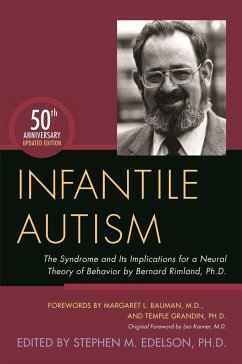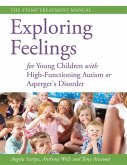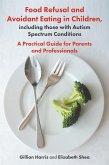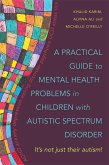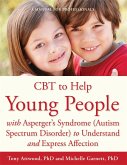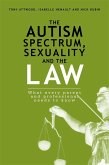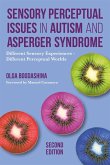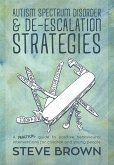Infantile Autism
The Syndrome and Its Implications for a Neural Theory of Behavior by Bernard Rimland, Ph.D.
Herausgeber: Edelson, Stephen M
Infantile Autism
The Syndrome and Its Implications for a Neural Theory of Behavior by Bernard Rimland, Ph.D.
Herausgeber: Edelson, Stephen M
- Broschiertes Buch
- Merkliste
- Auf die Merkliste
- Bewerten Bewerten
- Teilen
- Produkt teilen
- Produkterinnerung
- Produkterinnerung
With updates from some of the best-known names in the autism field, Bernard Rimland's seminal work on autism theory is made available for a new generation of readers in this anniversary edition.
Andere Kunden interessierten sich auch für
![Exploring Feelings for Young Children with High-Functioning Autism or Asperger's Disorder Exploring Feelings for Young Children with High-Functioning Autism or Asperger's Disorder]() Dr Anthony AttwoodExploring Feelings for Young Children with High-Functioning Autism or Asperger's Disorder41,99 €
Dr Anthony AttwoodExploring Feelings for Young Children with High-Functioning Autism or Asperger's Disorder41,99 €![Food Refusal and Avoidant Eating in Children, Including Those with Autism Spectrum Conditions Food Refusal and Avoidant Eating in Children, Including Those with Autism Spectrum Conditions]() Gillian HarrisFood Refusal and Avoidant Eating in Children, Including Those with Autism Spectrum Conditions33,99 €
Gillian HarrisFood Refusal and Avoidant Eating in Children, Including Those with Autism Spectrum Conditions33,99 €![A Practical Guide to Mental Health Problems in Children with Autistic Spectrum Disorder A Practical Guide to Mental Health Problems in Children with Autistic Spectrum Disorder]() Alvina AliA Practical Guide to Mental Health Problems in Children with Autistic Spectrum Disorder41,99 €
Alvina AliA Practical Guide to Mental Health Problems in Children with Autistic Spectrum Disorder41,99 €![CBT to Help Young People with Asperger's Syndrome (Autism Spectrum Disorder) to Understand and Express Affection CBT to Help Young People with Asperger's Syndrome (Autism Spectrum Disorder) to Understand and Express Affection]() Michelle GarnettCBT to Help Young People with Asperger's Syndrome (Autism Spectrum Disorder) to Understand and Express Affection47,99 €
Michelle GarnettCBT to Help Young People with Asperger's Syndrome (Autism Spectrum Disorder) to Understand and Express Affection47,99 €![The Autism Spectrum, Sexuality and the Law The Autism Spectrum, Sexuality and the Law]() Nick DubinThe Autism Spectrum, Sexuality and the Law34,99 €
Nick DubinThe Autism Spectrum, Sexuality and the Law34,99 €![Sensory Perceptual Issues in Autism and Asperger Syndrome, Second Edition Sensory Perceptual Issues in Autism and Asperger Syndrome, Second Edition]() Olga BogdashinaSensory Perceptual Issues in Autism and Asperger Syndrome, Second Edition36,99 €
Olga BogdashinaSensory Perceptual Issues in Autism and Asperger Syndrome, Second Edition36,99 €![Autism Spectrum Disorder and De-Escalation Strategies Autism Spectrum Disorder and De-Escalation Strategies]() Steve BrownAutism Spectrum Disorder and De-Escalation Strategies28,99 €
Steve BrownAutism Spectrum Disorder and De-Escalation Strategies28,99 €-
-
-
With updates from some of the best-known names in the autism field, Bernard Rimland's seminal work on autism theory is made available for a new generation of readers in this anniversary edition.
Produktdetails
- Produktdetails
- Verlag: Jessica Kingsley Publishers
- 50th Revised edition
- Seitenzahl: 352
- Erscheinungstermin: 1. Dezember 2014
- Englisch
- Abmessung: 230mm x 156mm x 20mm
- Gewicht: 506g
- ISBN-13: 9781849057899
- ISBN-10: 1849057893
- Artikelnr.: 41128302
- Herstellerkennzeichnung
- Libri GmbH
- Europaallee 1
- 36244 Bad Hersfeld
- gpsr@libri.de
- Verlag: Jessica Kingsley Publishers
- 50th Revised edition
- Seitenzahl: 352
- Erscheinungstermin: 1. Dezember 2014
- Englisch
- Abmessung: 230mm x 156mm x 20mm
- Gewicht: 506g
- ISBN-13: 9781849057899
- ISBN-10: 1849057893
- Artikelnr.: 41128302
- Herstellerkennzeichnung
- Libri GmbH
- Europaallee 1
- 36244 Bad Hersfeld
- gpsr@libri.de
Edited by Stephen M. Edelson, Ph.D., Forewords by Temple Grandin, Ph.D. and Margaret L. Bauman, M.D., Original Foreword by Leo Kanner, M.D., Update contributors: James B. Adams, Ph.D., Bonnie Auyeung, Ph.D., Sidney M. Baker, M.D., Simon Baron-Cohen, Ph.D., V. Mark Durand, Ph.D., Richard E. Frye, M.D., Ph.D., Matthew S. Goodwin, Ph.D., Paul Millard Hardy, M.D, Martha R. Herbert, Ph.D., M.D., Michael Lombardo, Ph.D., Lucy Jane Miller, Ph.D., OTR, Robert K. Naviaux, M.D., Ph.D., Jon Pangborn, Ph.D., Jillian C. Sullivan, Ph.D., Darold A. Treffert, M.D.
Foreword to the New Edition. Margaret L. Bauman
M.D
Department of Anatomy and Neurobiology
Boston University School of Medicine
Integrated Center for Child Development
Newton
Massachusetts
US. Foreword to the New Edition. Temple Grandin
Ph.D
autism advocate and Associate Professor of Animal Science
Colorado State University
US. Introduction to the New Edition. Stephen M. Edelson
Ph.D
Director
Autism Research Institute
US. Foreword by Leo Kanner. Preface. General Introduction. Introduction to Part I. The Controversies and their Resolution: A Critical Analysis of the Literature. Introduction to Chapter 1. Stephen M. Edelson. 1. The Syndrome of Early Infantile Autism: Background
Course
Diagnosis and Prognosis. A. Background. B. Course and Symptom of the Disease. C. Prognosis. D. The Diagnosis of Autism. Introduction to Chapter 2. Stephen M. Edelson. 2. The Parents of Autistic Children. Parent Occupations. Stephen M. Edelson. Introduction to Chapter 3. Stephen M. Edelson. 3. The Etiology of Infantile Autism: The Problem of Biological versus Psychological Causation. A. The Arguments for Psychogenesis of Infantile Autism. B. The Case for Biological Causation. C. Psychogenesis as an Inadequate and Pernicious Hypothesis. A Commentary on Chapter 3. Robert K. Naviaux
M.D.
Ph.D.
Professor of Genetics
Department of Medicine
Pediatrics
and Pathology
University of California
San Diego School of Medicine
US. Introduction to Chapter 4. Stephen M. Edelson. 4. The Differentiation of Early Infantile Autism from Childhood Schizophrenia. Introduction to Part II. A Theory of Autism: Its Nature and Cause. Introduction to Chapter 5. Stephen M. Edelson. 5. Autism as a Cognitive Dysfunction. A. The Conceptual Impairment. B. A Hypothesized Relationship Between the Cognitive Dysfunction in Autism and the Reticular Formation of the Brain Stem. Cognitive Dysfunction: Impairment in Memory. Stephen M. Edelson. Introduction to Chapter 6. Stephen M. Edelson. 6. The Specific Biology of Infantile Autism: Sensory Phenomena
Psychopharmacology
Autopsy Reports and Hyperoxia as Related to the Reticular Formation. A. The Reticular Formation and Perception. B. Psychopharmacology. C. Autopsy Findings and Other Attempts to Determine the Organic Basis of Autism. D. Hyperoxia as a Possible Causative Factor. E. Discussion. Reflections on Bernard Rimland and the 50th Anniversary of Infantile Autism. Paul Millard Hardy
M.D.
Hardy Healthcare PLLC
US. Rimland's Contributions: The Role of Sensory Processing Challenges in Autism Spectrum Disorders. Lucy Jane Miller
Ph.D.
OTR
Clinical Director
Sensory Therapies And Research (STAR) Center and Research Directory
Sensory Processing Disorder (SPD) Foundation
US. Matthew S. Goodwin
Ph.D.
Assistant Professor
Department of Health Sciences
Northeastern University
US. Jillian C. Sullivan
Sensory Processing Disorder (SPD) Foundation
US. Vitamin B6. Jon B. Pangborn
Ph.D.
Former Consultant to the Autism Research Institute and Co-Founder of "Defeat Autism Now"
US. Introduction to Chapter 7. Stephen M. Edelson. 7. The Theory: Integration and Support. A. The Inheritance of Intelligence and its Biological Substrate. B. The Paradoxes of Intelligence. C. The Hypothesis of Oxygen Intolerance and the Cerebral Vasculature. Introduction to Chapter 8. James B. Adams
Ph.D.
Director
Autism/Asperger's Research Program
Arizona State University
US. 8. Ideas for Research. A. Diagnosis. B. Etiology. C. Therapy and Training. D. Broader Implications of Research on Autism. The Fetal Steroid Theory of Autism. Simon Baron-Cohen
Ph.D.
Autism Research Centre (ARC)
Cambridge University
UK. Bonnie Auyeung
Ph.D.
Autism Research Centre (ARC)
Cambridge University
UK. Michael Lombardo
Ph.D.
Autism Research Centre (ARC)
Cambridge University
UK. Wisdom and Vision: A Comment on Rimland's Concept of "Training" for Children with Autism. V. Mark Durand
University of South Florida
St. Petersburg
US. Relevance to Modern Biomarker of Autism. Richard E. Frye
M.D.
Ph.D.
University of Arkansas for Medical Sciences
Arkansas Children's Hospital
US. Introduction to Part III. Some Possible Implications for the Theory of Autism for a Theory of Behavior. Introduction to Chapter 9. Stephen M. Edelson. 9. Some Implications of Early Infantile Autism for the Study of Personality. A. Emotion and Parental Personalities. B. Drive and the Parental Personalities. C. Cyclothymia
Schizothymia
and the Parental Personalities. D. The Relationship Between Autism and Schizophrenia: A Hypothesis. Introduction to Chapter 10. Stephen M. Edelson. 10. Further Implications of the Study of Autism. A. The Abilities of Autistic Children. B. Distractability
Concentration
and Intelligence. C. Delayed Mental Audition. D. The Problem of Innateness of the Specific Affective Disturbance. Special Abilities and Savant Syndrome: An update on Dr. Rimlands observations. Darold A. Treffert
M.D.
Behavioral Health
Agnesian Health Care
Wisconsin
US. Introduction to Chapter 11. Stephen M. Edelson. 11. Some Implications of Early Infantile Autism for a Theory of Behavior. A. A Hypothesis Concerning Reticular Function. B. Toward a Neuron Entelechy Theory of Cognition. Rimland's Reticular Formation Theory of Autism in the Light of 50 Years of Brain Research. Martha R. Herbert
Ph.D.
M.D.
Assistant Professor of Neurology
Harvard Medical School
US. Appendix. Suggested Diagnostic Check List. Appendix. The Invisible Wall. Stephen M. Edelson. Appendix. Environmental Vulnerability and Everday Epigenetics: Empowering Treatment and Recovery. Martha R. Herbert. Appendix. Mark Rimland: An inspiration to us all. Stephen M. Edelson. Afterword. Sidney M. Baker
Ph.D.
Coordinator of the Autism Database Project for the Autism Research Institute. Bibliography. Name Index. Subject Index.
M.D
Department of Anatomy and Neurobiology
Boston University School of Medicine
Integrated Center for Child Development
Newton
Massachusetts
US. Foreword to the New Edition. Temple Grandin
Ph.D
autism advocate and Associate Professor of Animal Science
Colorado State University
US. Introduction to the New Edition. Stephen M. Edelson
Ph.D
Director
Autism Research Institute
US. Foreword by Leo Kanner. Preface. General Introduction. Introduction to Part I. The Controversies and their Resolution: A Critical Analysis of the Literature. Introduction to Chapter 1. Stephen M. Edelson. 1. The Syndrome of Early Infantile Autism: Background
Course
Diagnosis and Prognosis. A. Background. B. Course and Symptom of the Disease. C. Prognosis. D. The Diagnosis of Autism. Introduction to Chapter 2. Stephen M. Edelson. 2. The Parents of Autistic Children. Parent Occupations. Stephen M. Edelson. Introduction to Chapter 3. Stephen M. Edelson. 3. The Etiology of Infantile Autism: The Problem of Biological versus Psychological Causation. A. The Arguments for Psychogenesis of Infantile Autism. B. The Case for Biological Causation. C. Psychogenesis as an Inadequate and Pernicious Hypothesis. A Commentary on Chapter 3. Robert K. Naviaux
M.D.
Ph.D.
Professor of Genetics
Department of Medicine
Pediatrics
and Pathology
University of California
San Diego School of Medicine
US. Introduction to Chapter 4. Stephen M. Edelson. 4. The Differentiation of Early Infantile Autism from Childhood Schizophrenia. Introduction to Part II. A Theory of Autism: Its Nature and Cause. Introduction to Chapter 5. Stephen M. Edelson. 5. Autism as a Cognitive Dysfunction. A. The Conceptual Impairment. B. A Hypothesized Relationship Between the Cognitive Dysfunction in Autism and the Reticular Formation of the Brain Stem. Cognitive Dysfunction: Impairment in Memory. Stephen M. Edelson. Introduction to Chapter 6. Stephen M. Edelson. 6. The Specific Biology of Infantile Autism: Sensory Phenomena
Psychopharmacology
Autopsy Reports and Hyperoxia as Related to the Reticular Formation. A. The Reticular Formation and Perception. B. Psychopharmacology. C. Autopsy Findings and Other Attempts to Determine the Organic Basis of Autism. D. Hyperoxia as a Possible Causative Factor. E. Discussion. Reflections on Bernard Rimland and the 50th Anniversary of Infantile Autism. Paul Millard Hardy
M.D.
Hardy Healthcare PLLC
US. Rimland's Contributions: The Role of Sensory Processing Challenges in Autism Spectrum Disorders. Lucy Jane Miller
Ph.D.
OTR
Clinical Director
Sensory Therapies And Research (STAR) Center and Research Directory
Sensory Processing Disorder (SPD) Foundation
US. Matthew S. Goodwin
Ph.D.
Assistant Professor
Department of Health Sciences
Northeastern University
US. Jillian C. Sullivan
Sensory Processing Disorder (SPD) Foundation
US. Vitamin B6. Jon B. Pangborn
Ph.D.
Former Consultant to the Autism Research Institute and Co-Founder of "Defeat Autism Now"
US. Introduction to Chapter 7. Stephen M. Edelson. 7. The Theory: Integration and Support. A. The Inheritance of Intelligence and its Biological Substrate. B. The Paradoxes of Intelligence. C. The Hypothesis of Oxygen Intolerance and the Cerebral Vasculature. Introduction to Chapter 8. James B. Adams
Ph.D.
Director
Autism/Asperger's Research Program
Arizona State University
US. 8. Ideas for Research. A. Diagnosis. B. Etiology. C. Therapy and Training. D. Broader Implications of Research on Autism. The Fetal Steroid Theory of Autism. Simon Baron-Cohen
Ph.D.
Autism Research Centre (ARC)
Cambridge University
UK. Bonnie Auyeung
Ph.D.
Autism Research Centre (ARC)
Cambridge University
UK. Michael Lombardo
Ph.D.
Autism Research Centre (ARC)
Cambridge University
UK. Wisdom and Vision: A Comment on Rimland's Concept of "Training" for Children with Autism. V. Mark Durand
University of South Florida
St. Petersburg
US. Relevance to Modern Biomarker of Autism. Richard E. Frye
M.D.
Ph.D.
University of Arkansas for Medical Sciences
Arkansas Children's Hospital
US. Introduction to Part III. Some Possible Implications for the Theory of Autism for a Theory of Behavior. Introduction to Chapter 9. Stephen M. Edelson. 9. Some Implications of Early Infantile Autism for the Study of Personality. A. Emotion and Parental Personalities. B. Drive and the Parental Personalities. C. Cyclothymia
Schizothymia
and the Parental Personalities. D. The Relationship Between Autism and Schizophrenia: A Hypothesis. Introduction to Chapter 10. Stephen M. Edelson. 10. Further Implications of the Study of Autism. A. The Abilities of Autistic Children. B. Distractability
Concentration
and Intelligence. C. Delayed Mental Audition. D. The Problem of Innateness of the Specific Affective Disturbance. Special Abilities and Savant Syndrome: An update on Dr. Rimlands observations. Darold A. Treffert
M.D.
Behavioral Health
Agnesian Health Care
Wisconsin
US. Introduction to Chapter 11. Stephen M. Edelson. 11. Some Implications of Early Infantile Autism for a Theory of Behavior. A. A Hypothesis Concerning Reticular Function. B. Toward a Neuron Entelechy Theory of Cognition. Rimland's Reticular Formation Theory of Autism in the Light of 50 Years of Brain Research. Martha R. Herbert
Ph.D.
M.D.
Assistant Professor of Neurology
Harvard Medical School
US. Appendix. Suggested Diagnostic Check List. Appendix. The Invisible Wall. Stephen M. Edelson. Appendix. Environmental Vulnerability and Everday Epigenetics: Empowering Treatment and Recovery. Martha R. Herbert. Appendix. Mark Rimland: An inspiration to us all. Stephen M. Edelson. Afterword. Sidney M. Baker
Ph.D.
Coordinator of the Autism Database Project for the Autism Research Institute. Bibliography. Name Index. Subject Index.
Foreword to the New Edition. Margaret L. Bauman
M.D
Department of Anatomy and Neurobiology
Boston University School of Medicine
Integrated Center for Child Development
Newton
Massachusetts
US. Foreword to the New Edition. Temple Grandin
Ph.D
autism advocate and Associate Professor of Animal Science
Colorado State University
US. Introduction to the New Edition. Stephen M. Edelson
Ph.D
Director
Autism Research Institute
US. Foreword by Leo Kanner. Preface. General Introduction. Introduction to Part I. The Controversies and their Resolution: A Critical Analysis of the Literature. Introduction to Chapter 1. Stephen M. Edelson. 1. The Syndrome of Early Infantile Autism: Background
Course
Diagnosis and Prognosis. A. Background. B. Course and Symptom of the Disease. C. Prognosis. D. The Diagnosis of Autism. Introduction to Chapter 2. Stephen M. Edelson. 2. The Parents of Autistic Children. Parent Occupations. Stephen M. Edelson. Introduction to Chapter 3. Stephen M. Edelson. 3. The Etiology of Infantile Autism: The Problem of Biological versus Psychological Causation. A. The Arguments for Psychogenesis of Infantile Autism. B. The Case for Biological Causation. C. Psychogenesis as an Inadequate and Pernicious Hypothesis. A Commentary on Chapter 3. Robert K. Naviaux
M.D.
Ph.D.
Professor of Genetics
Department of Medicine
Pediatrics
and Pathology
University of California
San Diego School of Medicine
US. Introduction to Chapter 4. Stephen M. Edelson. 4. The Differentiation of Early Infantile Autism from Childhood Schizophrenia. Introduction to Part II. A Theory of Autism: Its Nature and Cause. Introduction to Chapter 5. Stephen M. Edelson. 5. Autism as a Cognitive Dysfunction. A. The Conceptual Impairment. B. A Hypothesized Relationship Between the Cognitive Dysfunction in Autism and the Reticular Formation of the Brain Stem. Cognitive Dysfunction: Impairment in Memory. Stephen M. Edelson. Introduction to Chapter 6. Stephen M. Edelson. 6. The Specific Biology of Infantile Autism: Sensory Phenomena
Psychopharmacology
Autopsy Reports and Hyperoxia as Related to the Reticular Formation. A. The Reticular Formation and Perception. B. Psychopharmacology. C. Autopsy Findings and Other Attempts to Determine the Organic Basis of Autism. D. Hyperoxia as a Possible Causative Factor. E. Discussion. Reflections on Bernard Rimland and the 50th Anniversary of Infantile Autism. Paul Millard Hardy
M.D.
Hardy Healthcare PLLC
US. Rimland's Contributions: The Role of Sensory Processing Challenges in Autism Spectrum Disorders. Lucy Jane Miller
Ph.D.
OTR
Clinical Director
Sensory Therapies And Research (STAR) Center and Research Directory
Sensory Processing Disorder (SPD) Foundation
US. Matthew S. Goodwin
Ph.D.
Assistant Professor
Department of Health Sciences
Northeastern University
US. Jillian C. Sullivan
Sensory Processing Disorder (SPD) Foundation
US. Vitamin B6. Jon B. Pangborn
Ph.D.
Former Consultant to the Autism Research Institute and Co-Founder of "Defeat Autism Now"
US. Introduction to Chapter 7. Stephen M. Edelson. 7. The Theory: Integration and Support. A. The Inheritance of Intelligence and its Biological Substrate. B. The Paradoxes of Intelligence. C. The Hypothesis of Oxygen Intolerance and the Cerebral Vasculature. Introduction to Chapter 8. James B. Adams
Ph.D.
Director
Autism/Asperger's Research Program
Arizona State University
US. 8. Ideas for Research. A. Diagnosis. B. Etiology. C. Therapy and Training. D. Broader Implications of Research on Autism. The Fetal Steroid Theory of Autism. Simon Baron-Cohen
Ph.D.
Autism Research Centre (ARC)
Cambridge University
UK. Bonnie Auyeung
Ph.D.
Autism Research Centre (ARC)
Cambridge University
UK. Michael Lombardo
Ph.D.
Autism Research Centre (ARC)
Cambridge University
UK. Wisdom and Vision: A Comment on Rimland's Concept of "Training" for Children with Autism. V. Mark Durand
University of South Florida
St. Petersburg
US. Relevance to Modern Biomarker of Autism. Richard E. Frye
M.D.
Ph.D.
University of Arkansas for Medical Sciences
Arkansas Children's Hospital
US. Introduction to Part III. Some Possible Implications for the Theory of Autism for a Theory of Behavior. Introduction to Chapter 9. Stephen M. Edelson. 9. Some Implications of Early Infantile Autism for the Study of Personality. A. Emotion and Parental Personalities. B. Drive and the Parental Personalities. C. Cyclothymia
Schizothymia
and the Parental Personalities. D. The Relationship Between Autism and Schizophrenia: A Hypothesis. Introduction to Chapter 10. Stephen M. Edelson. 10. Further Implications of the Study of Autism. A. The Abilities of Autistic Children. B. Distractability
Concentration
and Intelligence. C. Delayed Mental Audition. D. The Problem of Innateness of the Specific Affective Disturbance. Special Abilities and Savant Syndrome: An update on Dr. Rimlands observations. Darold A. Treffert
M.D.
Behavioral Health
Agnesian Health Care
Wisconsin
US. Introduction to Chapter 11. Stephen M. Edelson. 11. Some Implications of Early Infantile Autism for a Theory of Behavior. A. A Hypothesis Concerning Reticular Function. B. Toward a Neuron Entelechy Theory of Cognition. Rimland's Reticular Formation Theory of Autism in the Light of 50 Years of Brain Research. Martha R. Herbert
Ph.D.
M.D.
Assistant Professor of Neurology
Harvard Medical School
US. Appendix. Suggested Diagnostic Check List. Appendix. The Invisible Wall. Stephen M. Edelson. Appendix. Environmental Vulnerability and Everday Epigenetics: Empowering Treatment and Recovery. Martha R. Herbert. Appendix. Mark Rimland: An inspiration to us all. Stephen M. Edelson. Afterword. Sidney M. Baker
Ph.D.
Coordinator of the Autism Database Project for the Autism Research Institute. Bibliography. Name Index. Subject Index.
M.D
Department of Anatomy and Neurobiology
Boston University School of Medicine
Integrated Center for Child Development
Newton
Massachusetts
US. Foreword to the New Edition. Temple Grandin
Ph.D
autism advocate and Associate Professor of Animal Science
Colorado State University
US. Introduction to the New Edition. Stephen M. Edelson
Ph.D
Director
Autism Research Institute
US. Foreword by Leo Kanner. Preface. General Introduction. Introduction to Part I. The Controversies and their Resolution: A Critical Analysis of the Literature. Introduction to Chapter 1. Stephen M. Edelson. 1. The Syndrome of Early Infantile Autism: Background
Course
Diagnosis and Prognosis. A. Background. B. Course and Symptom of the Disease. C. Prognosis. D. The Diagnosis of Autism. Introduction to Chapter 2. Stephen M. Edelson. 2. The Parents of Autistic Children. Parent Occupations. Stephen M. Edelson. Introduction to Chapter 3. Stephen M. Edelson. 3. The Etiology of Infantile Autism: The Problem of Biological versus Psychological Causation. A. The Arguments for Psychogenesis of Infantile Autism. B. The Case for Biological Causation. C. Psychogenesis as an Inadequate and Pernicious Hypothesis. A Commentary on Chapter 3. Robert K. Naviaux
M.D.
Ph.D.
Professor of Genetics
Department of Medicine
Pediatrics
and Pathology
University of California
San Diego School of Medicine
US. Introduction to Chapter 4. Stephen M. Edelson. 4. The Differentiation of Early Infantile Autism from Childhood Schizophrenia. Introduction to Part II. A Theory of Autism: Its Nature and Cause. Introduction to Chapter 5. Stephen M. Edelson. 5. Autism as a Cognitive Dysfunction. A. The Conceptual Impairment. B. A Hypothesized Relationship Between the Cognitive Dysfunction in Autism and the Reticular Formation of the Brain Stem. Cognitive Dysfunction: Impairment in Memory. Stephen M. Edelson. Introduction to Chapter 6. Stephen M. Edelson. 6. The Specific Biology of Infantile Autism: Sensory Phenomena
Psychopharmacology
Autopsy Reports and Hyperoxia as Related to the Reticular Formation. A. The Reticular Formation and Perception. B. Psychopharmacology. C. Autopsy Findings and Other Attempts to Determine the Organic Basis of Autism. D. Hyperoxia as a Possible Causative Factor. E. Discussion. Reflections on Bernard Rimland and the 50th Anniversary of Infantile Autism. Paul Millard Hardy
M.D.
Hardy Healthcare PLLC
US. Rimland's Contributions: The Role of Sensory Processing Challenges in Autism Spectrum Disorders. Lucy Jane Miller
Ph.D.
OTR
Clinical Director
Sensory Therapies And Research (STAR) Center and Research Directory
Sensory Processing Disorder (SPD) Foundation
US. Matthew S. Goodwin
Ph.D.
Assistant Professor
Department of Health Sciences
Northeastern University
US. Jillian C. Sullivan
Sensory Processing Disorder (SPD) Foundation
US. Vitamin B6. Jon B. Pangborn
Ph.D.
Former Consultant to the Autism Research Institute and Co-Founder of "Defeat Autism Now"
US. Introduction to Chapter 7. Stephen M. Edelson. 7. The Theory: Integration and Support. A. The Inheritance of Intelligence and its Biological Substrate. B. The Paradoxes of Intelligence. C. The Hypothesis of Oxygen Intolerance and the Cerebral Vasculature. Introduction to Chapter 8. James B. Adams
Ph.D.
Director
Autism/Asperger's Research Program
Arizona State University
US. 8. Ideas for Research. A. Diagnosis. B. Etiology. C. Therapy and Training. D. Broader Implications of Research on Autism. The Fetal Steroid Theory of Autism. Simon Baron-Cohen
Ph.D.
Autism Research Centre (ARC)
Cambridge University
UK. Bonnie Auyeung
Ph.D.
Autism Research Centre (ARC)
Cambridge University
UK. Michael Lombardo
Ph.D.
Autism Research Centre (ARC)
Cambridge University
UK. Wisdom and Vision: A Comment on Rimland's Concept of "Training" for Children with Autism. V. Mark Durand
University of South Florida
St. Petersburg
US. Relevance to Modern Biomarker of Autism. Richard E. Frye
M.D.
Ph.D.
University of Arkansas for Medical Sciences
Arkansas Children's Hospital
US. Introduction to Part III. Some Possible Implications for the Theory of Autism for a Theory of Behavior. Introduction to Chapter 9. Stephen M. Edelson. 9. Some Implications of Early Infantile Autism for the Study of Personality. A. Emotion and Parental Personalities. B. Drive and the Parental Personalities. C. Cyclothymia
Schizothymia
and the Parental Personalities. D. The Relationship Between Autism and Schizophrenia: A Hypothesis. Introduction to Chapter 10. Stephen M. Edelson. 10. Further Implications of the Study of Autism. A. The Abilities of Autistic Children. B. Distractability
Concentration
and Intelligence. C. Delayed Mental Audition. D. The Problem of Innateness of the Specific Affective Disturbance. Special Abilities and Savant Syndrome: An update on Dr. Rimlands observations. Darold A. Treffert
M.D.
Behavioral Health
Agnesian Health Care
Wisconsin
US. Introduction to Chapter 11. Stephen M. Edelson. 11. Some Implications of Early Infantile Autism for a Theory of Behavior. A. A Hypothesis Concerning Reticular Function. B. Toward a Neuron Entelechy Theory of Cognition. Rimland's Reticular Formation Theory of Autism in the Light of 50 Years of Brain Research. Martha R. Herbert
Ph.D.
M.D.
Assistant Professor of Neurology
Harvard Medical School
US. Appendix. Suggested Diagnostic Check List. Appendix. The Invisible Wall. Stephen M. Edelson. Appendix. Environmental Vulnerability and Everday Epigenetics: Empowering Treatment and Recovery. Martha R. Herbert. Appendix. Mark Rimland: An inspiration to us all. Stephen M. Edelson. Afterword. Sidney M. Baker
Ph.D.
Coordinator of the Autism Database Project for the Autism Research Institute. Bibliography. Name Index. Subject Index.

